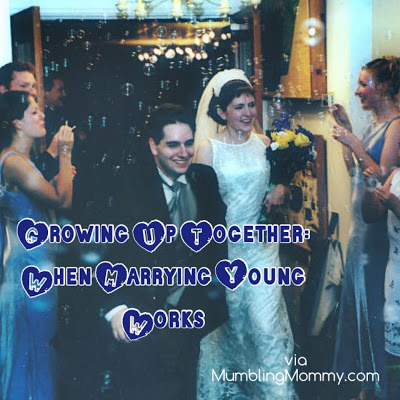I saw a beautiful wedding picture of a friend-of-a-friend on Facebook recently. The couple is very young — about 18 or 19 — and they look like they should be posing for prom pictures, not wedding photos. I showed it to my husband, and he agreed that they were marrying young for sure.
We’re total hypocrites.
 |
| On a boat trip in 1998 (with his sister giving us “bunny ears.”) |
We’ve also been together since our late teens. My husband and I met at college; he was a freshman, I was a sophomore. We started dating around Thanksgiving, and by the end of that school year, we were engaged.
My parents told me that I could get married whenever I liked, but once I was married, they’d stop paying my tuition, because, “If you’re old enough to get married, you’re old enough to pay for college.” Their strategy worked, and we were together for over three years before tying the knot.
So here we are, roughly half of of our lives later, with two kids, a dog, and a mortgage (of course), and we’re happier than ever in our marriage. I know other “marrying young” relationships that have grown stale or imploded, and there’s no simple formula for why one relationship works when another one falls apart. But I do know that marrying young has shaped my adult life in ways I never imagined at 22. Here are a few things I know now that I didn’t know then.
Marrying Young
1. The longer I’m married, the less I believe in “soul mates.”
“This is true love. You think this happens every day?”
I’m a romantic at heart, and I love The Princess Bride, but I don’t agree with Wesley (sorry.) When my husband and I first fell in love, I believed we were soul mates, destined to be together, etc. I don’t think that anymore, and yet I love him so much more now than I did then.
 |
| Pre-kids vacation in France, 2006. |
If soul mates were real, relationships would be a lot less work. The whole idea of a soul mate is that two people complete each other and make each other whole. If that’s the case, then why do people in long marriages talk about how much work it is? If you’re each other’s perfect half and you complete each other, shouldn’t everything work itself out naturally?
You’re not, and it doesn’t. The truth is, my husband is not the only person in the entire universe that I could have married and been happy with, nor am I the only person in the universe who could have made him happy. We’ve had to work hard and fail many times over in order to become a couple who is fair, honest, open, and mutually supportive.None of those things happened instantly or without a lot of stops and starts. But since we were both willing to work so hard on our marriage over the years, we know that we could have worked hard for a different marriage with a different partner, too, as long as that person had the qualities we both value, such as intelligence, kindness, and a sense of humor.
2. “For better or worse” is not just a promise: it’s a choice
Like all long-term couples, my husband and I have been through many highs and lows together. The lows include losing our first baby in a miscarriage; career changes; cross-country moves; financial struggles; the usual stresses of parenting young children; and many other difficulties. With each crisis, we’ve grown closer and stronger, not because it was the instinctive thing to do, but because we knew we had to choose whether a crisis would drive us apart or drive us together.
In the days following my miscarriage, my first instinct was to retreat inside myself. But my husband wouldn’t let me grieve alone; he was grieving, too, and I remember him pulling me to him and holding me tight as we mourned our baby together. In that moment, he decided that our loss would make us closer, and it did. At other times, I had been the one to pull him closer and reconnect. Now it’s instinctual for us to turn to each other when things get tough, but that’s a habit we had to intentionally develop over time.
3. Less “honesty,” more authenticity, is a good thing.
 |
| Two kids and a few vacations later … |
When we were dating and marrying young, I thought emotional intimacy meant sharing every thought with your partner. That’s easy for me — I’m very extroverted and tend to over-share — but it was an alarming idea for my introverted husband. I thought if he was too quiet, he might be hiding something from me. I said I wanted honesty, but what I wanted was ongoing reassurance that he “really” loved me.
Years later, I’m not plagued by all that insecurity (thank goodness), nor do I feel like I need to know everything my husband is thinking. In fact, being married to an introvert means that he can still surprise and impress me with his ideas, insights, and dreams. I love those surprises.
Being together for our whole adult lives also means that we know each other extremely, sometimes annoyingly, well. Each of us knows right away when the other person is deceiving themselves or others. Neither one of us can “get away” with anything, because the other picks up on it right away. We’re alert to each other’s moods and know each other’s strengths and weaknesses as well as we know our own.
We have to be authentic with each other because we can’t be anything else. Our authentic selves are imperfect and messy, but that’s who we are. Unlike new couples, we can’t “gloss over” the less savory parts of our personalities or habits.
4. You need mentors
When you’re dating or marrying young, it’s natural to have an “us against the world” feeling. But in the long run, we’ve needed older, more experienced couples to help guide us through our married life. We are uniquely blessed in that our parents are all still together. Both couples were married in 1972, just a few months apart from each other. Both families enjoy happy, functional marriages. And the two families are great friends, but that’s a post for another day!
Besides our parents, it’s also helped to have married friends closer to our age. When I was in my mid-20’s, I befriended a woman then in her 30’s. I was newly married; her marriage was more than a decade old and falling apart. Perhaps because of this, she had a unique insight on what makes a healthy marriage (since hers so clearly wasn’t.)
I leaned on her for advice and support when my husband and I struggled. She pointed out that despite our current disagreements, we were genuinely loving and supportive of one another. She helped me see that our foundation was strong and sure and gave me a perspective I lacked. (You’ll be happy to know that she has since remarried and also now enjoys the happy, healthy marriage she had longed for.)
Conclusion: There’s no magic bullet
Ultimately, it’s a bit of a mystery why some marriages hold together and while others fall apart. No two marriages are exactly the same, and no one but the people involved truly know what happens beneath the surface. I am grateful that I love and am loved by the same man who fell for me when I was 19 and who has seen me through college, grad school, and motherhood. We’ve grown up together and gone through so many changes, we’re not the same people we were all those years ago. As my sister-in-law pointed out recently, we’re lucky in that we each like who the other person turned out to be. It’s a blessing we don’t take for granted.
First time here? Like Mumbling Mommy on Facebook to continue the conversation!
Category: SpousesTags: Elizabeth









